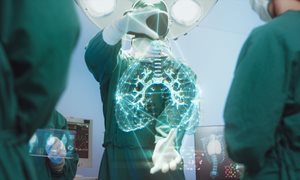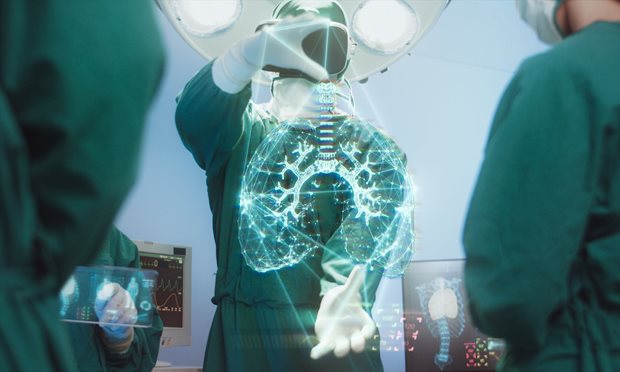

Radboudumc: AI for Health hotspot of the Netherlands
Artificial Intelligence (AI) supports healthcare in many ways. It helps doctors with diagnostics and treatment. It teaches us more about diseases. And: it helps reduce workloads, staff shortages, and costs of care.
learn moreRadboudumc: AI for Health hotspot of the Netherlands
AI (Artificial Intelligence) is a collective term for systems and machines that mimic our intelligence. Such systems can quickly process large amounts of data and use it, among other things, to provide advice, develop new products, and improve themselves. This makes AI a hugely important technology for tomorrow's healthcare. After all, much of healthcare revolves around the rapid and accurate analysis of (health) data: what symptoms do we see in a patient, what diagnosis fits, and what is the best treatment?
These questions are becoming more and more complicated for doctors to answer, as research and technological advances put more and more data at our disposal. AI can help us quickly draw the right conclusions from all that data and thus, in time, provide truly customized care. This will also help reduce costs and workload in healthcare.
Applications of AI
Research into suitable applications for AI is ongoing. For some applications, such as the detection of certain cancers, AI has already been proven to perform as well or even better than the physician. We expect AI, thanks in part to our research, to be of value in more and more areas of healthcare in the coming years.
As far as we are concerned, the work of healthcare professionals will never be completely replaced by AI. It is a tool that assists patients and doctors in quickly finding the right information and making good, informed choices. However, the final say always remains with the patient, in proper consultation with their practitioner.
Radboudumc as AI for Health hotspot
We are working on tomorrow's healthcare. AI and data-driven decision-making play a major role in this. That is why we are exploring the possibilities and limits and what they can mean for our patients and society. We would like to take you along during our journey. On this page you will find more about the initiatives and research we are conducting and supporting, as well as the impact that we are already making with AI, and the impact we expect to make.
-
AI-driven tissue analysis offers new insights into endometriosis25 March 2025
-
Pinched nerve or misalignment: AI finds the cause of lower back painAI can assist radiologists in detecting abnormalities in the spine7 February 2025
-
Aiosyn achieves IVDR CE marking for mitosis counting with AI9 January 2025
Impact on health(care)
What is AI and deep learning?
AI is a collective term for systems or machines that mimic our intelligence. This allows them to perform tasks for us, and improve themselves at the same time.
learn moreWhat is AI and deep learning?
AI is a collective term for systems or machines that mimic our intelligence. This allows them to perform tasks for us, and improve themselves at the same time.
Part of AI is machine learning: this involves a learning system that can improve itself based on the data it receives. For example, chatbots that understand your problems and automatically provide an answer, or a program that gives you automatic recommendations for movies based on your viewing habits.
Deep learning
A variant of machine learning is deep learning. An AI system can recognize complex patterns in large data sets by using algorithms that mimic the workings of the human brain, so-called 'deep neural networks'. The difference between deep learning and the broader term 'machine learning' is the accuracy of analyses the algorithms do: they are so thorough that they are similar to the processes in our brains. A network of these algorithms can therefore process large amounts of data and learn from it.
Data is everywhere in hospitals: patient records, clinical measurements, genetic information, text reports, and images. That data forms the basis of diagnoses, decisions, treatments, monitoring and real-time support during operations and procedures, for example.
Support in diagnostics
It is possible to recognize patterns in that medical data, for example, to aid in diagnostics. In other medical fields where large amounts of data are available, such as genetics, temporal monitoring or large texts (patient records), deep learning can also improve scientific research, and thus clinical practice.
AI can support clinical decisions and automate tasks, thereby reducing costs and keeping healthcare affordable. It can also improve healthcare by finding better ways to extract clinically useful information from data.
How does AI help our patient and healthcare?
With the help of AI, we are making healthcare better in quality. We can make faster and more accurate diagnoses and need fewer people to do so.
learn moreHow does AI help our patient and healthcare?
AI can add value to healthcare and to patients in several ways.
For starters, it can help people at home gain more insight into their health, and based on that, get them the right care faster. One example is the WondGezond app (in Dutch), which is in development at Radboudumc. Someone recovering from surgery at home can use this app to take a picture of their wound. The app will then use AI to analyze the wound to determine if it is healing properly. If everything looks good, the app will let you know immediately. If in doubt, a doctor can review the photo and, if necessary, tailored care is available.
Diagnostics using AI
AI can also help healthcare providers in making diagnoses, for example when analyzing radiological or pathological images. In oncological hospital care, this is already being applied or further developed in various ways, for example by Radboudumc spin-offs Aiosyn and Thirona. But also in the practice of the general practitioner or obstetrician, more and more opportunities for AI are emerging. For example, Ardim - another Radboudumc spin-off - is working on an app that makes it possible to use a cell phone to diagnose hip dysplasia in unborn children. Delft Imaging is using similar technology in its BabyChecker app, which allows health care providers in Africa and Southeast Asia to detect potential problems early during pregnancy. This AI technology was also co-developed at Radboudumc.
Podcast: AI for life
In this series, top experts, including from Radboudumc, discuss the latest developments in AI, which we are shaping here and now.
to podcastInitiatives and collaborations
ICAI Labs
We are a prominent participant in and coordinator of several ICAI Labs. These are research collaborations between government, industry, and knowledge institutions in the field of AI.
overview of labsICAI Labs
We are a prominent participant in and coordinator of several ICAI Labs. An ICAI Lab is a research collaboration between government, industr,y and knowledge institutions in the field of AI. ICAI research collaborations happen under the umbrella of the national Innovation Center for Artificial Intelligence (ICAI).
Radboudumc is involved with partners in:
-
A collaboration between Radboudumc and Radboud University to develop new AI applications in healthcare.
-
Investigating the use of AI applications to monitor Parkinson's disease using wearable sensors and video. The goal is to make more reliable clinical diagnoses and provide patients with appropriate treatment more quickly.
Related news
-
Research on monitoring health and behavior, and developing AI applications to provide improved personal health advice.
-
Researching AI applications that can analyze high-resolution data streams in real-time and derive accurate safe models from them. The focus is on so-called OCT pullbacks; data streams that are crucial for decision-making during cardiac surgery.
-
Development of machine learning solutions that, in combination with implants, can help restore sensory and cognitive functions.
-
Researching AI applications to better diagnose prostate cancer based on MRI images.
-
Investigating AI applications to improve the accuracy of imaging diagnoses in lung cancer.
Radboudumc spin-offs in AI
Radboudumc has originated several spin-offs in the field of AI.
see spin-offsRadboudumc spin-offs in AI
-
AI application for automated quality control of pathological images.
-
Smartphone AI applications for medical imaging 'at the point of care'.
-
AI applications for breast cancer detection.
-
AI applications for analysis of chest CT scans.
Radboud Healthy Data
A joint program of Radboud University and Radboudumc aimed at boosting the digital transformation on campus.
to the websiteHealth-RI
Health-RI's mission is better health(care) for citizens and patients by reusing health data with an integrated health data infrastructure for research, policy and innovation.
to health-ri.nl
Work with impact. Are you in?
We believe that artificial intelligence and data-driven decision-making are crucial in shaping the healthcare of the future. Are you with us?
working in data-driven health